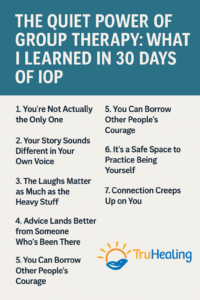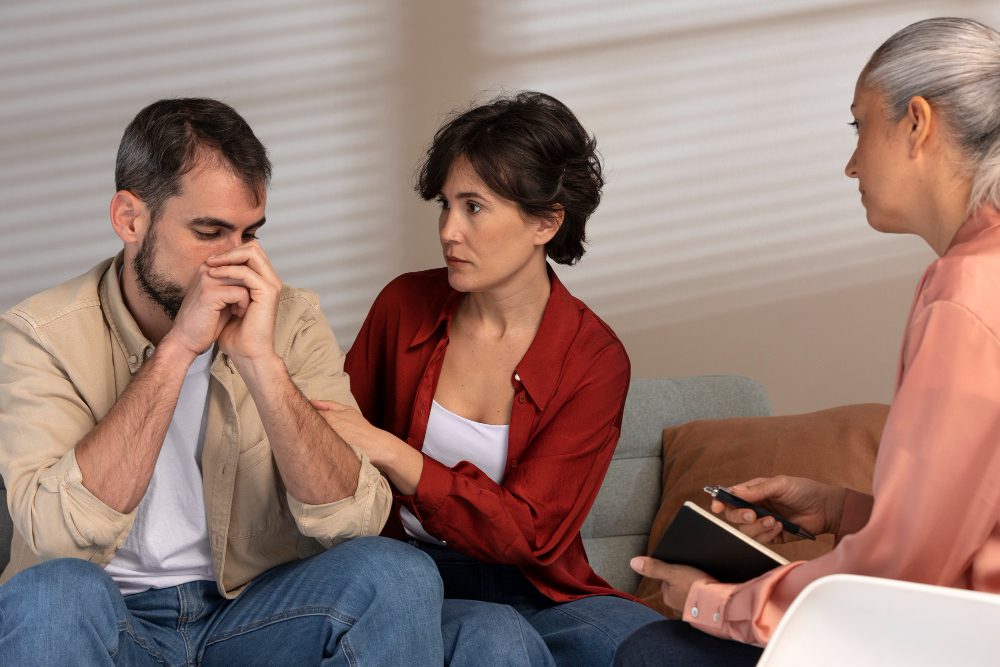Even when you’re committed to staying sober, it can feel like you’ve stepped off the planet your peers are still living on. That’s how I felt walking into my first group therapy session. IOP wasn’t just about “talking feelings” in a circle. It was where I learned that being the “weird sober one” can actually be a kind of superpower—if you’re in the right room, with the right people.
At TruHealing Cincinnati, group therapy isn’t a lecture. It’s a living, breathing space where awkward hellos turn into real conversations, where you learn that sobriety doesn’t have to be lonely, and where even the heaviest days can end with laughter.
Here’s what stood out to me during my first month.
1. You’re Not Actually the Only One
On day one, I was convinced no one would relate to me. I imagined everyone else in the room would be older, “further along,” or have problems completely different from mine. But as people shared, I heard my own story in pieces—someone else who avoided bars now, another person trying to figure out what to say when offered a drink, someone else who hated the word “alcoholic” but still wanted to stay sober.
Cincinnati has a bigger recovery community than I realized. Once you find even a small part of it, the feeling of being the only one starts to fade.
2. Your Story Sounds Different in Your Own Voice
I thought I already knew my story. I’d told it in my head a hundred times. But the first time I actually said it in group therapy, it landed differently. Out loud, it felt less like a confession and more like taking ownership.
One group member told me afterward, “Hearing you talk about your second week sober reminded me of my first—and it made me want to keep going.” That’s the thing: when you speak your truth in a safe space, it doesn’t just help you. It can help someone else too.
3. The Laughs Matter as Much as the Heavy Stuff
Not going to lie—I expected group therapy to feel like sitting in a circle of people crying for two hours. And yes, there were heavy moments. But I also laughed more than I expected.
One day, a guy shared about accidentally grabbing a kombucha at a coffee shop and panicking because it “tasted suspiciously alive.” The whole group cracked up. We weren’t laughing at him—we were laughing with him. Humor didn’t take away the seriousness of what we were doing. It just reminded us that sobriety doesn’t erase joy.
4. Advice Lands Better from Someone Who’s Been There
Friends mean well. Family means well. But when someone in your group says, “Here’s how I handled my first sober wedding,” it hits differently.
I learned practical, small-scale strategies in group therapy that I hadn’t seen in any workbook—like always having an exit plan for social events or keeping a “rescue text” ready for when temptation crept in. These weren’t abstract ideas. They were tried-and-true tactics from people who’d been exactly where I was.

5. You Can Borrow Other People’s Courage
There were days I showed up to IOP not wanting to talk. Maybe I’d had a fight with a friend, or maybe I just didn’t want to be that vulnerable. But every time someone else spoke with honesty, I felt my own walls lower.
Courage is contagious in group therapy. When you see someone else take a risk—share something messy, ask for help, admit they almost drank—you realize it’s safe to do the same.
6. It’s a Safe Space to Practice Being Yourself
Being young and sober means figuring out who you are without substances—and that can feel like trying to solve a puzzle in the dark. Group therapy gave me a place to test out the new version of me.
Sometimes I said too much. Sometimes I said nothing. But each week, I got closer to a version of myself that felt more real. And I did it in a space where I knew I wouldn’t get judged for fumbling.
7. Connection Creeps Up on You
I didn’t expect to make friends. I was there for treatment, not socializing. But about three weeks in, I realized I was actually looking forward to seeing certain people. I wanted to hear their updates. I wanted them to hear mine.
That’s the sneaky part about group therapy—you might come for the coping skills, but you end up staying for the people.
FAQ: Group Therapy in Cincinnati
1. What is group therapy in an IOP setting?
Group therapy in an Intensive Outpatient Program (IOP) is a structured, therapist-led session where clients share experiences, learn coping skills, and support each other. At TruHealing Cincinnati, it’s part of a comprehensive approach to recovery that combines therapy, education, and peer connection.
2. Will I have to talk in my first session?
No. You can listen as much as you need to at first. Most people speak when they feel ready, and no one forces you to share before you want to.
3. Is group therapy only for addiction?
No. While it’s a key part of addiction recovery, group therapy can also address mental health struggles, relationship challenges, and coping strategies for stress.
4. How many people are in a group?
At TruHealing Cincinnati, groups are intentionally kept small so everyone has space to participate and feel heard. This usually means 6–10 people per session.
5. What if I don’t connect with anyone?
It can take time to feel comfortable. Many people start off feeling disconnected but find common ground within a few weeks. Even if you don’t “click” right away, you can still benefit from hearing other people’s experiences.
If you’ve been wondering whether group therapy is worth it, my 30 days in IOP at TruHealing Cincinnati proved it’s more than a checkbox in recovery. It’s where you stop feeling like the “weird one” and start realizing you’ve found your people.
📞 Call (888) 643-9118 or visit TruHealing Cincinnati’s group therapy page to learn more about our group therapy services in Cincinnati, Ohio.

